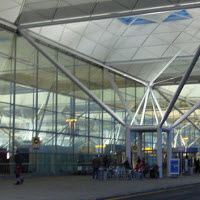Newcastle and Stansted Airports Puzzling Comments Backfire
- Written by Roberto Castiglioni
 We take this or that very seriously. How many times have we heard airport management use these words following an incident or a complaint?
We take this or that very seriously. How many times have we heard airport management use these words following an incident or a complaint?
Used and abused, the catchy phrase “we take it very seriously” is beginning to sound like sorry; everybody says it, but only a handful truly mean it.
However, as we look back to recent cases, we take it very seriously gains a far more sinister connotation, actually indicating the contrary of what it stands for.
Few months ago we were reviewing the website of Newcastle International airport and noticed that Quality Standards were unavailable. Regulation EC1107/2006 requires airports to publish their quality standards, as they indicate the timeframe within which passengers with special needs will be helped.
We asked Newcastle airport to tell us why they had not published them. "Newcastle Airport’s quality standards are not published, but records are kept and all staff has strict internal targets to meet," the airport's spokesperson said.
The airport replied in a manner most mainstream media would have fallen for. Too bad for Newcastle, we are the only publication solely focusing on access to aviation.
The law requires yearly audits of Quality Standards, hence we asked the airport how they complied with this
requirement. “PRM handling is audited independently by the Department for Transport, and airlines including British Airways, easyJet, Jet2, Thomas Cook and Thomson,” the spokeswoman said.
In a perfect world, Newcastle would have gotten away with this answer. Unfortunately for them, it was the wrong reply. For starters, the Department for Transport does not audit quality standards, nor do airlines. "The Government monitors the effectiveness of the legislation through regular liaison with the Civil Aviation Authority," a spokesperson for the DfT said. "The CAA monitors data on performance, and targets those who underperform."
Quite interestingly, the Civil Aviation Authority was not even mentioned in Newcastle airport’s answers. Contrary to Newcastle airport, we take compliance, or lack thereof, very seriously in the true meaning of the word, hence we reported our findings to the CAA.
Following our lead, the Civil Aviation Authority visited Newcastle airport. We are delighted to report that the airport now publishes its quality standards, which are now audited by the CAA.
While examples of taking matters very seriously like Newcastle airport are borderline hilarious, others, involving the wellbeing of passengers with severe reduced mobility are on the brink of human tragedy.
Few months ago, upon disembarking at London Stansted airport, a passenger traveling with his own wheelchair found his mobility device had been seriously damaged. He made a damage report, and was sent away.
While investigating the case, we asked Stansted airport why the passenger was not offered a replacement wheelchair, as the law requires. "It is the responsibility of the service provider to offer a temporary replacement of damaged or lost mobility equipment, albeit not necessarily on a like-for-like basis and as you are aware, the provider at London Stansted is ISS," the airport's Procurement Manager said.
A straightforward reply mainstream media would buy in a heartbeat; however, what Stansted airport said is
seriously incorrect. The law states that the airport may provide assistance to passengers with special needs itself. Alternatively, in keeping with its responsibility, and subject always to compliance with the quality standards the airport may contract with one or more other parties for the supply of the assistance.
The case above is one we take very seriously. We have formally asked the Civil Aviation Authority to take immediate action in pursuing Stansted airport for breaching Regulation EC1107/2006.
The bottom line is fairly simple. There shall be no room for misunderstandings with accessibility or assistance services at airports, just like there shall be no room for ignorance or lack of accountability. Most importantly, it is time all airports in the United Kingdom and beyond take access to aviation very seriously, and show they do so delivering excellence instead of empty words.
Do you require assistance when traveling by air? Have your say.
About the author
Founder and Editor-in-Chief of Reduced Mobility Rights, Roberto Castiglioni is an expert of airport accessibility, management and support procedures of passengers with special needs and air travel related regulations. He has been a frequent flyer for the past three decades and has several years of experience as travelling partner of a passenger who requires assistance.
Roberto provides accessibility and access consulting services to airports and airlines. He is a member of the UK Civil Aviation Authority Access To Air Travel Working Group. He is also a member of the Easyjet Special Assistance Advisory Group. Esaag provides Easyjet with strategic guidance and practical advice on the evolving needs of passengers requiring special assistance.










